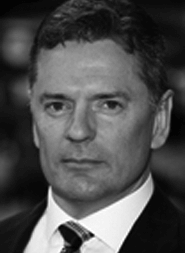board of directors

Geoff Wilding
Executive Chairman
Geoff is a former investment banker. He set up his own investment company in New Zealand in 1989. Geoff was appointed Executive Chairman at the General Meeting on 3 October 2012 and has been responsible for execution of the Company’s strategy ever since.

Philippe Hamers
Chief Executive Officer
Philippe has over 25 years’ experience in the flooring industry and headed Europe’s largest carpet manufacturing operation at Balta Group. Prior to this, Philippe was General Manager of the Tufted and Woven Division of Beaulieu International Group.

Brian Morgan
Chief Financial Officer
Prior to joining Victoria in 2022, Brian was Director of Group Finance at Synthomer plc. He has worked in several other FTSE 250 multi-national companies in senior commercial finance and head office roles. Brian is a chartered accountant and has worked for Andersen and Deloitte in Corporate Finance and Audit.

Andrew Harrison
Non-executive Director
Andrew has more than twenty years as a solicitor in private practice, specialising in company law. He has advised on a wide variety of corporate transactions, including management buy-outs and buy-ins, corporate acquisitions and disposals and listed company take-overs.

Gavin Petken
Non-executive Director
Gavin is a private equity investor with over 20 years experience across multiple asset classes and sectors. He was previously Head of Investment South and Quoted at BGF, responsible for leading investment and portfolio teams across a number of offices. He was also a member of BGF’s national executive leadership team, national investment committee, and responsible for managing BGF’s UK wide investment activity into public companies, BGF Quoted. Before BGF, Gavin was a Managing Director in Private Equity with RBS plc for 13 years.
Joe Scribbins
Non-executive Director
Joe is a Managing Director of Koch Equity Development LLC, where he founded and leads their Commercial Excellence Team. He holds an MBA from Massachusetts Institute of Technology Sloan School of Management.
the board
The Board is committed to maintaining an appropriate balance between Executive and Non-executive Directors. During the course of the year, reviews of the remuneration of the Chairman, the Non-Executive Directors and the Executive Directors were carried out.
The Board’s primary role is to set the strategic direction of the Group as a whole, leaving day-to-day operational matters delegated to the two Executive boards of the Group’s subsidiary undertakings.
Board meetings are usually held at the operating sites in order that the Board members have the opportunity to gain a direct appreciation of the Group’s operations. Board meetings operate to a standing agenda ensuring that matters requiring regular or annual review are given sufficient time for debate and scrutiny.
In addition to the formal scheduled meetings, additional ad hoc Board and Committee meetings were held during the year to consider any time critical matters.
information, professional development and performance evaluation
The Chairman seeks to ensure that the Board is supplied in a timely manner with information that is relevant, accurate and complete in order that the Board is able to carry out its duties. All Directors follow an induction programme on joining the Board and the Chairman seeks to ensure that all Directors regularly update and refresh relevant skills and knowledge.
The Directors have access to the advice and services of the Company Secretary and are empowered to take independent professional advice in the furtherance of their duties at the Company’s expense, where necessary. The Company Secretary also provides advice and support to each of the Board’s committees and to the Chairman on all corporate governance issues. The Group maintains insurance cover in respect of the liability of its Directors and officers to third parties.
conflicts of interest
With effect from 1 October 2008, Section 175 of the Companies Act 2006 introduced a statutory duty on a Director to avoid a situation in which he has, or can have, a direct or indirect interest that conflicts, or possibly may conflict, with the interests of the Company. This duty is not infringed if the situation cannot reasonably be regarded as likely to give rise to a conflict or if the conflict has been authorised by the Board. The Company’s Articles of Association allow unconflicted Directors to authorise conflict situations in appropriate circumstances. Procedures have been put in place for the disclosure of any such conflicts and, if appropriate, authorisation of the same. The procedures permit any authorisation to be granted subject to terms or conditions.
The Nominations Committee reviews any potential conflict of interest for any prospective Director and all continuing authorisations annually and makes recommendations to the Board.
The Company maintains a register of any conflicts of interest of a Director, including the date of grant of the authorisation and any limitations or terms and conditions that apply. Any authorisations given by the Board are reviewed and may be renewed, varied or revoked at any time.
investor relations
The Chairman and the Board seek to ensure that the views of major shareholders are understood by the Board. The Chairman meets regularly with the major shareholders and updates are provided to all Board meetings. See here for details of substantial shareholders.
The Board recognises the Annual General Meeting (AGM) as an important opportunity to meet private shareholders. At its AGM, which is chaired by the Chairman, the Company complies with the provisions of the Code relating to the disclosure of proxy votes, the separation of resolutions and the attendance (when physically possible) of the Committee Chairmen. The Company’s procedure is to arrange for the notice of the AGM and related papers to be posted to Shareholders at least twenty working days in advance to allow for consideration prior to the meeting.
financial reporting
The Board seeks to present a balanced and understandable assessment of the Company’s position and prospects.
committees
Audit Committee
Chaired by: Andrew Harrison
Other Members: Gavin Petken
The Audit Committee is appointed by the Board on the recommendation of the Nomination Committee and, where possible, from amongst the Non-executive Directors of the Group.
How often does the Committee meet?
The Audit Committee meets at least twice a year at appropriate times in the reporting and audit cycle and otherwise as required.
What are the main responsibilities of the Audit Committee?
The Committee’s responsibilities are set out in its terms of reference, which include the following:
- To review the adequacy of the Group’s accounting, financial and operating controls and make recommendations as appropriate.
- To review the proposed accounts of the Group prior to publication and make recommendations regarding the rate of dividend and any other special appropriations.
- To recommend the appointment of the Auditor and review the scope and results of its audit.
- To review the planning of internal and external audits, receive reports thereon and deal with any control weaknesses identified.
- To monitor the extent of non-audit work that the Auditor can perform to ensure that the provision of these non-audit services falls within the Group’s policies and does not impair its objectivity or independence.
The Audit Committee is required to report its findings to the Board, identifying any matters in respect of which it considers that action or improvement is needed and make recommendations as to the steps to be taken.
Who is the Group’s Auditor?
Grant Thornton is the Group’s current Auditor, having originally been appointed in January 2016. The external Auditor is required to rotate the engagement partner responsible for the Group every five years. There are no contractual obligations restricting the Company’s choice of external auditor.
What is the policy on the Auditor providing non-audit services?
In order to seek to preserve auditor objectivity and independence, the Company has a policy regulating the provision on non-audit services by the Auditor. Excluding local taxation advice, this is subject to the approval of the Group Finance Director and the Audit Committee. The ratio of audit fees to non-audit fees charged by the external auditor in any one year as a proportion of the annual external audit fee is kept under regular review to ensure that neither their independence nor their objectivity is put at risk.
Nominations Committee
Chaired by: Andrew Harrison
Other Members: Gavin Petken, Geoffrey Wilding
What is the Committee’s role?
The Nominations Committee reviews the composition and balance of the Board and senior Executive team on a regular basis to ensure that the Board and management have the right structure, skills and experience in place for the effective management of the Group in order to operate efficiently and effectively. This review includes a forward looking analysis of the skills and diversity required of Board members, which is also reviewed and discussed with the Board.
What is the process for appointing Executive and Non-executive Directors?
When recruiting both Executive and Non-executive Directors, the Committee considers the skills, experience, knowledge and diversity that would benefit both the Board and its committees.
What are the main responsibilities of the Nominations Committee?
The Committee’s responsibilities are set out in its terms of reference, which include the following:
- To review the structure, size and composition of the Board and make recommendations with regard to any changes that are considered necessary, including the continuation of existing Directors in office.
- Succession planning for Executive Board appointments.
- Identify and nominate candidates for Board approval to fill Board vacancies as and when they arise.
- To conduct an annual review and identification of the time commitment required from Non-executive Directors.
- To make recommendations to the Board regarding membership of the Audit and Remuneration Committees in consultation with the Chairman of each committee.
Recent Appointments
The current Non-executive Directors were appointed by shareholders at the General Meeting held on 3 October 2012. Following this process, the Board appointed Geoffrey Wilding as Executive Chairman.
Remuneration Committee
Chaired by: Gavin Petken
Other Members: Andrew Harrison
Meetings regularly attended by invitation by:
Geoffrey Wilding, Executive Chairman
The Committee receives material assistance from advice given by the Non-executive Directors of the Group’s Australian subsidiary: M W Oakley and M J Davies.
How often does the Committee meet?
The Committee meets at least twice a year to review and determine the remuneration of the Executive Directors and the directors of subsidiary companies.
What are the main responsibilities of the Remuneration Committee?
The Committee’s responsibilities are set out in its terms of reference, which include the following:
- To determine and agree with the Board, the remuneration policy for the Group Managing Director, Chairman, Executive Directors and senior managers.
- To review progress made against KPI targets and agree final performance-related bonus awards.
- To review the design of share incentive plans for approval by the Board and shareholders and determine the annual award policy for Executive Directors and senior Executives under existing plans.
- Within the terms of the agreed policy, determine the remainder of the remuneration packages (principally comprising salary and pension) for each Executive Director.
- To review and note the remuneration trends across the Group.
What is the Directors’ Remuneration Policy?
The Directors’ Remuneration Policy is to ensure that remuneration is sufficiently attractive to attract, retain and motivate Executive Directors and directors of subsidiary companies of a calibre that meets the Group’s needs to achieve its performance against financial objectives and relevant competitors.
Remuneration throughout the Group is designed to be competitive in the country of employment.
The Committee gives full consideration to the requirements in Schedule A to the Combined Code.
The current principal components of remuneration are:
- Basic salary and benefits
- Performance-related bonuses
- Performance Share Plan (PSP)
- Long Term Incentive Plan (LTIP)
- Pensions
